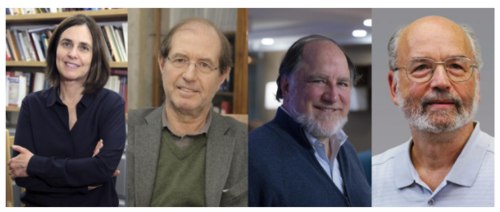| BBVA Frontiers Of Knowledge Award 2017 |
| Written by Sue Gee | |||
| Monday, 22 January 2018 | |||
|
The 10th Edition of the BBVA Foundation Frontiers of Knowledge Award in the Information and Communication Technologies category goes to Shafi Goldwasser, Silvio Micali, Ronald Rivest and Adi Shamir for their “fundamental contributions to modern cryptology, an area of a tremendous impact on our everyday life.” According to the citation, the work of Goldwasser, Micali, Rivest and Shamir: “is crucial to the fabric of our connected digital society. Every time we log in to social media, purchase goods online, or vote or sign electronically, we leverage the technology developed by their research. “Their advanced crypto-protocols enable the safe and secure transmission of electronic data, ranging from e-mail to financial transactions. In addition, their work provides the underpinning for digital signatures, blockchains and crypto-currencies.”
Inaugurated in 2008 by the major multinational Spanish banking group, BBVA, this international award programme recognizes significant contributions in the areas of scientific research and cultural creation with ICT being one of three categories. Nominations, which are now open for the 2018 edition, are evaluated by a panel of distinguished academics and industry leaders According to the BBVA announcement: For the jury, the rise of today’s digital age could never have happened without techniques that ensure the secure exchange, use and storage of information. Cryptography is an “invisible” technology that is nonetheless indispensable for today’s society. Over the space of four decades, the new laureates have not only laid the foundations of this complex field, but have also continued to enlarge it with breakthroughs that exploit the possibilities of the vast wealth of information now at our command, the famous Big Data, or have driven the development of potentially world-changing technologies like crypto-currencies.
Shafi Goldwasser, Silvio Micali, Ronald Rivest, Adi Shamir
In 1978, Adi Shamir and Ronald Rivest, together with Leonard Adleman, created the RSA algorithm (whose initials correspond to their surnames) which is explained in I-Programmer's article on Public Key Encryption and is still a widely used protocol, particularly in combination with other techniques. Shamir and Rivest, now working respectively out of Israel’s Weizmann Institute and the Massachusetts Institute of Technology (USA), arrived at this first breakthrough while collaborating closely at MIT, and in the forty years since then have continued to contribute actively in diverse areas of cryptography. Goldwasser was then studying at Carnegie Mellon University (USA) and Micali at the Sapienza University of Rome. A few years later, in 1982, the two coincided on a doctorate course at the University of California, Berkeley (USA) and embarked on a fruitful collaboration whose first big result would lay the theoretical foundations of the field – the mathematical demonstration of when an encryption method is genuinely unbreakable. As we reported at the time Goldwasser and Micali were awarded the 2012 ACM Turing Award for their work in cryptography and complexity theory. On being informed of the award, Rivest remarked on how much cryptography, and society with it, has changed during his career: “In the late 1970s, we didn’t even have the World Wide Web, it was impossible to imagine that our method would become what it is today. Right now, each time we make an online purchase, the transaction’s security is based on our encryption technology, and it is thanks to this technology that we can be sure we are talking to Amazon, and vice versa.” Goldwasser singled out another contribution, vital to properly harness the power of big data. When a series of organizations pool their databases to extract the greatest possible amount of information from the resulting aggregate, but without disclosing the identity embedded in the data. She believes it is vital that citizens learn to value their personal data, and stop giving them away for free, insisting that, with today’s cryptographic tools, privacy and security are readily compatible. She is also convinced of the area’s huge untapped potential: “We have effective cryptographic methods that are still not being used… IT firms should do more to build systems to make use of the beautiful ideas we have come up with in the cryptographic field that have never been implemented.”
More InformationGoldwasser, Micali, Rivest and Shamir win the Frontiers of Knowledge Award in ICT
Related ArticlesGoldwasser and Micali win Turing Award Diffie and Hellman Receive Turing Award AI's Founding Father Marvin Minsky Wins Award Levchin Prize for Real-World Cryptography To be informed about new articles on I Programmer, sign up for our weekly newsletter, subscribe to the RSS feed and follow us on Twitter, Facebook or Linkedin.
Comments
or email your comment to: comments@i-programmer.info |
|||
| Last Updated ( Friday, 18 February 2022 ) |



